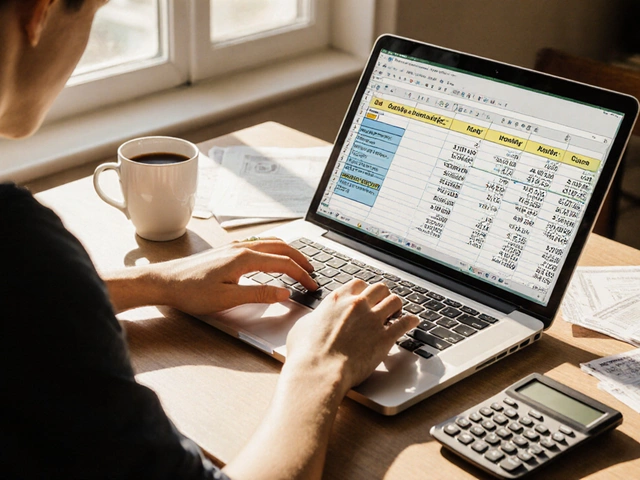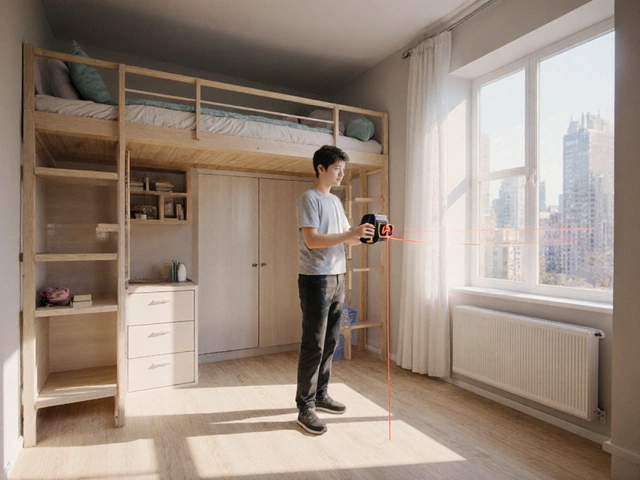Does Owning Property Make You a Millionaire? Unpacking Commercial Real Estate Wealth

You know what’s funny? Everyone always talks about property like it’s a golden ticket to the millionaire’s club. Buy a building, forget about it, and wake up rich, right? Well, it’s a lot messier than that. Just ask anyone who’s dealt with a midnight call about a busted water pipe in their strip mall.
Let’s be honest—owning commercial property can absolutely make you richer, but it doesn’t work like magic. You have to consider how money flows in (and out!), the headaches that pop up along the way, and what makes a deal actually pay off. Some folks accidentally buy themselves a second job when they imagined easy money. If you’re thinking about jumping into commercial real estate, it’s smart to look beyond the hype and see what ownership really looks like—day in, day out.
- The Millionaire Myth: Real Estate and Wealth
- How Property Generates Money: Not Just Price Appreciation
- The Hidden Costs and Common Pitfalls
- Passive Income Versus Active Headaches
- Commercial vs. Residential: Real Pros and Cons
- Tips If You’re Thinking of Buying Commercial Property
The Millionaire Myth: Real Estate and Wealth
There’s this old story that simply owning property—especially commercial property—makes you rich. But here’s the truth: real estate has made plenty of millionaires, but it’s not automatic. Around 90% of the world’s millionaires have made some of their wealth through real estate, but the part people skip is that real estate takes work, timing, money, and a bit of luck. You can lose money or get stuck for years if you buy wrong or mismanage your building.
Let’s look at how people actually turn owning property into serious wealth. It’s not just from values going up overnight. Most of the real money in commercial real estate comes from:
- Regular rental income (think tenants paying for office or shop space)
- Property values appreciating over time (which depends a lot on the local economy and demand)
- Tax breaks (like write-offs for mortgage interest and depreciation)
- Leverage (using borrowed money to own more stuff...riskier, but it amplifies gains)
Here’s a quick look at how wealth-building in property stacks up versus a regular job or investing in stocks for the long haul:
| Asset | Main Wealth Source | Average Return (Annually) |
|---|---|---|
| Commercial Property | Rental Income & Value Growth | 6-12% |
| Stocks (S&P 500) | Stock Price & Dividends | 7-10% |
| Average Job | Salary | 2-4% Raises |
Sure, those numbers look tempting, but commercial real estate isn’t exactly a get-rich-quick hack. It’s closer to running a business than just being a passive investor. You’re making decisions, handling problems, talking to tenants, and dealing with market swings. Plus, unlike stocks, you can’t just sell off part of your building if you need quick cash.
So yes, owning the right building at the right time can make you a millionaire, but it’s rarely pure luck or just sitting around waiting. It’s about making smart moves, staying on top of things, and knowing enough not to get burned by a fancy marketing pitch.
How Property Generates Money: Not Just Price Appreciation
When you hear about someone making a killing in commercial real estate, it’s not always because the building’s value shot up overnight. Sure, price appreciation matters, but most seasoned owners aren’t just waiting for the market to boom—they’re making money in a bunch of other ways.
The biggest chunk often comes from rental income. If you own a retail center, office space, or even a warehouse, tenants pay you rent monthly. Multiply that by a dozen or more tenants, and you’ve got a steady stream of cash. Some deals also include things like percentage rent, where you earn a slice of your tenant’s sales if business is good. In other words, you’re not just betting on the property getting more expensive; you’re banking on reliable cash flow.
Don’t forget about things like triple-net leases, either. In this setup, tenants cover most of the property expenses (think insurance, taxes, and repairs), so your rent is mostly net profit. That’s why so many investors eye these deals—they can make holding commercial real estate feel almost hands-off.
There are also extra income streams you might not think about right away, like:
- Charging for parking spaces or adding paid features (vending machines, storage units, even rooftop cell towers)
- Hosting events or temporary pop-ups in unused space
- Advertising opportunities, like billboards on busy sites
Cash flow is king when we talk about building wealth through property, but people sometimes forget about another sneaky source of profit: loan paydown. Every time a tenant’s rent covers your mortgage payment, part of that goes toward owning more of the building outright. Over the years, you build equity, which is like a hidden savings account that grows on autopilot.
| How Commercial Property Makes Money | What It Means |
|---|---|
| Rental Income | Monthly or yearly payments from tenants |
| Appreciation | Property value goes up over time |
| Loan Paydown | Equity increases as mortgages are paid off |
| Added Income Streams | Parking, vending, billboards, events |
| Tax Benefits | Depreciation and expense write-offs lower taxable income |
And here’s something pretty sweet: the IRS lets you depreciate commercial properties over 39 years. It sounds wonky, but it basically means you get tax breaks just for owning the place. Not many businesses hand you a perk like that each April.
The bigger picture? Owning property is rarely a simple buy-and-hold play. If you’re smart, you’re collecting income every step of the way—not just hoping your building is worth a fortune when you’re ready to sell.
The Hidden Costs and Common Pitfalls
There’s a reason you hear horror stories about property owners who thought they’d get rich quick—and it usually comes down to unexpected expenses. When people focus only on the sticker price, they miss the avalanche of owning property costs waiting around the corner.
Let’s get real about where your money actually goes. It’s not just the mortgage or the down payment. Here are some surprise costs that hit commercial property owners the hardest:
- Maintenance and Repairs: Roof leaks, HVAC failures, or even graffiti cleanup add up fast. A 2023 survey from BOMA found average annual maintenance costs for small commercial buildings are around $2.50 per square foot—that’s thousands a year, just to keep the lights on and the roof dry.
- Property Taxes: Forgetting to factor in local taxes can kill your budget. And cities love to hike commercial rates.
- Insurance: Commercial property insurance isn’t just expensive, it’s going up every year thanks to extreme weather and rising construction costs.
- Vacancies: Lost rent from empty units can put a big hole in your cash flow. It’s rare for a building to stay 100% leased year-round.
- Professional Fees: Accountants, property managers, lawyers—take your pick. It all comes out before profits ever hit your pocket.
Want to see how those numbers stack up? Check this simple estimate for a 10,000 sq ft retail property in the Midwest:
| Expense Type | Annual Cost Estimate |
|---|---|
| Maintenance & Repairs | $25,000 |
| Property Taxes | $18,000 |
| Insurance | $7,000 |
| Vacancies (5% lost rent) | $12,000 |
| Professional Fees | $6,000 |
All of this before you see a dollar in profit.
Here are some pitfalls new owners fall into way too often:
- Underestimating renovation or upgrade costs—old HVACs or outdated wiring can gut your budget.
- Counting on rent increases that don’t happen. Tenants aren’t always willing (or able) to pay more; sometimes, they just move on.
- Assuming you’ll always have great tenants. Bad renters can skip out on payments, leave damage, and then you’re stuck cleaning up the mess, literally.
So, while commercial real estate can be a route to real wealth, you’ve got to budget for way more than just the mortgage. The property game rewards players who think ahead, not just those who dream big.

Passive Income Versus Active Headaches
You always hear people brag about owning property for “passive income.” Sounds sweet—collect rent checks while chilling at home with your pets (my cat Mia is all about that lifestyle). But in reality, “passive” only fits if you hire a rock-star property manager. Even then, there’s plenty that’ll drag you back in.
When you invest in commercial real estate, the biggest draw is monthly rental income. Compared to residential places, commercial tenants usually sign longer leases—think dentists, accountants, or that local coffee shop you love. Longer leases mean more predictable money coming in.
But here’s the rub: It’s not just cash flow. If a tenant goes out of business, you could face months with zero rent. Maintenance emergencies and legal issues pop up at the worst times. The active work comes with:
- Chasing down late or missed rent payments
- Getting involved if tenants have problems with the city or neighbors
- Coordinating repairs for big-ticket stuff (like roof leaks or HVAC failures)
- Handling lease renewals and rate negotiations
According to the National Association of Realtors, about 34% of small commercial property owners manage properties themselves, which basically means weekends spent fixing things or fielding angry calls. Hardly passive.
On the flip side, properties in sweet spots—near offices, hospitals, or colleges—may rarely go empty and give steady income. But risk follows reward: you pay more up front, and property taxes can bite hard.
If you want the income without headaches, you’ll likely pay a property manager 4%-10% of gross rent. That eats into profits but saves your sanity. One pro tip: keep a cash reserve for every property. Experts suggest socking away 3-6 months of expenses for when things really hit the fan.
Commercial vs. Residential: Real Pros and Cons
The showdown between commercial real estate and residential property is way more than just the price tag. If you’re hoping to hit millionaire status, it really matters which path you pick. Let’s break down what sets them apart.
First up, commercial property covers offices, shops, warehouses, and even those plazas you see at every intersection. Residential is your regular house, condo, apartment, or duplex. Their rules, risks, and rewards look very different.
Commercial real estate usually comes with:
- Bigger upfront costs and closing fees (think six figures just to get your foot in the door).
- Longer leases—businesses often sign on for 3, 5, or even 10 years, making your rental income more predictable than the annual lease churn of apartments.
- Triple-net leases (the tenants pay their share of property taxes, insurance, and maintenance), which means fewer surprise expenses for you.
- Potentially higher returns. Data from the National Council of Real Estate Investment Fiduciaries showed average annual returns for commercial property outpacing residential properties over the last decade.
Now, here’s the other side. Residential real estate usually:
- Requires less money to buy—sometimes you only need 5-20% down (compared to 25-40% for commercial real estate).
- Is much easier to finance. Banks love lending for houses, but get pickier with commercial buildings.
- Has more buyers and renters, so if you want to sell or rent out, you have a bigger pool to work with.
- Feels simpler for newbies. Fewer moving parts, and you probably already “get” houses just by living in one.
Here’s a side-by-side for comparison:
| Factor | Commercial | Residential |
|---|---|---|
| Typical Down Payment | 25-40% | 5-20% |
| Lease Length | 3-10 years | 1 year |
| Cash Flow Predictability | Higher | Lower |
| Tenant Turnover | Lower | Higher |
| Ease of Financing | Harder | Easier |
And here’s a fun fact: Empty stores or offices can sit on the market for months, or even years, especially when the economy’s rough. Houses usually move much faster. On the flip side, when you snag a good commercial tenant, your cash flow gets a whole lot less stressful.
So, which is the better path to becoming a millionaire? If you’re looking for big returns and you’re not afraid of putting more skin in the game, commercial property might win. If you want less risk and fewer headaches, residential might be your jam. Choosing between the two is really about your appetite for risk, how much cash you’ve got, and how involved you want to be in the day-to-day grind.
Tips If You’re Thinking of Buying Commercial Property
Ready to dip your toe into commercial real estate? Here’s the stuff you’ll wish you knew up front. These tips should keep you from stepping on the same rakes everyone else does.
- Know the numbers inside and out. Don’t just look at sticker price. Get a handle on property taxes, insurance, repair costs, expected rent, and vacancy rates. Small things add up and can wreck your cash flow.
- Location isn’t everything—but it’s close. If you buy right next to a busy road or near a university, tenants are way easier to find. Properties in out-of-the-way places might seem like a deal but they stay empty longer (which stings).
- Check the lease agreements. Tenants in commercial buildings have all sorts of lease options—triple net, full service, gross, modified gross. If you don’t know what these mean, read up. Getting stuck with all the expenses because you picked the wrong lease is a painful way to learn.
- Plan for surprises. Save some cash for sudden repairs or tenants who disappear. A typical rule of thumb is to keep at least 10% of the property’s annual income set aside for stuff you didn’t expect.
- Get the right team. Commercial properties aren’t DIY projects. Find a property-savvy attorney and a good CPA before you sign anything. They’ll save your bacon more than once.
- Understand financing differences. Loans for commercial buildings are usually shorter-term and may need bigger down payments (expect 20% to 30%). Bankers look really closely at the income the property pulls in, not just your credit score.
Here’s a quick look at how risks and rewards play out in commercial real estate compared to residential investments:
| Aspect | Commercial Property | Residential Property |
|---|---|---|
| Average Down Payment | 20-30% | 10-20% |
| Lease Terms | 3-10 years (often) | 1 year (typical) |
| Vacancy Risk | Can be higher | Usually lower |
| Maintenance Costs | Often paid by tenant (NNN lease) | Usually paid by landlord |
| Management Required | Moderate to high | Lower |
Dive into owning property with your eyes wide open. Don’t skip the homework or the walk-throughs. And if you catch yourself getting excited over a shiny building, slow down. Vet every detail before you make your move. That’s what separates the actual millionaires from everyone who just wishes they were one.









Write a comment